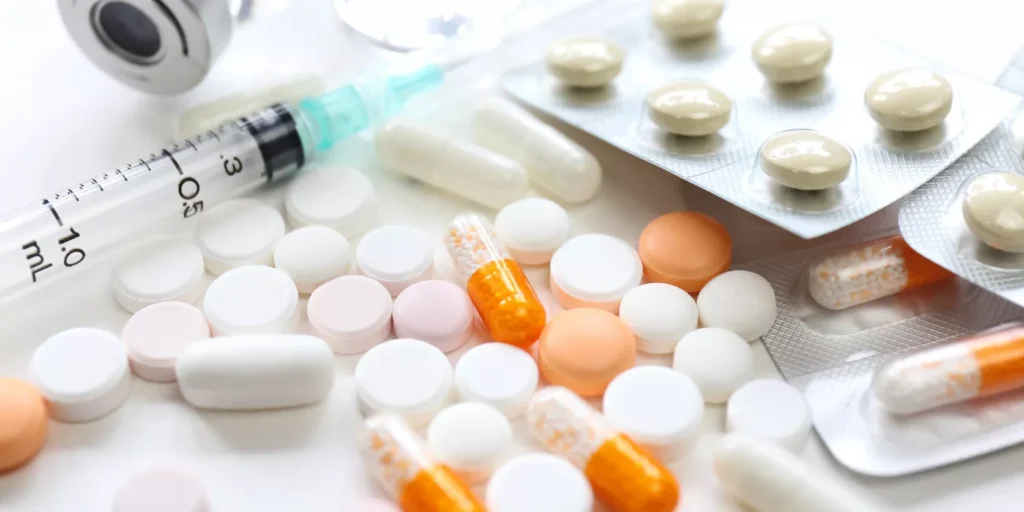Millions of people struggle with substance use disorders. Vivitrol is one effective medication which provides hope to individuals suffering from the disease. In this detailed blog, we will navigate through how vivitrol medication can serve as a vital part of a complete treatment and recovery process from alcohol dependence as well as opioid addiction. Let us dive right into learning all you need to know about the life-altering treatment avenue for opioid or alcohol dependence:
Vivitrol Medication: Understanding What Vivitrol Is and How is Vivitrol Used

Vivitrol is used to treat alcohol dependence as well as opioid use disorder, as well as addiction to them. Moreover, it is also used to treat opioid use disorders. When it comes to treating opioid use disorder, it functions as a resilient antagonist whose main job is to block specific receptors present in the brain. Patients treated with vivitrol have higher chances of recovering. Let us take a closer look at what is vivitrol:
What is Vivitrol?
Vivitrol is a kind of extended-release injectable form of naltrexone, which is an active ingredient in vivitrol medications. Doctors and healthcare professionals use vivitrol for the treatment of opioid use disorder. Vivitrol stops or acts as a blockade for mu opioid receptors which are present in the human brain. Since vivitrol acts this way, it minimizes cravings as well as the desire for consuming drugs and alcohol. The best part is that vivitrol is approved by the FDA.
The medication steadily releases into the person’s body over approximately 30 days after it has been injected into the individual’s gluteal muscle. Patients get vivitrol as a vital part of a treatment plan which is much broader and which also includes counseling sessions as well as support groups.
The Primary Uses of Vivitrol
Vivitrol aids in the recovery of patients from OUD as well as alcohol use disorder. As mentioned earlier, it blocks all the harmful and adverse effects which opioids inflict on consumers and minimize the cravings for consuming alcohol. In simpler words, it blocks the effects of opioids on the human brain. Below, we will cover all possible uses of vivitrol in terms of treatment:
The vivitrol medication is provided to patients by healthcare providers in the form of an injection once every month. Since it toils on the human brain’s receptors like methadone, more specifically the mu opioid receptors, vivitrol medication also minimizes the sensations of pleasure which an individual might experience due to drinking alcohol or opioid consumption. This factor makes it highly convenient for patients to remain focused on their journey towards recovery without relapsing or returning to old, harmful habits.
Vivitrol’s Role in the Treatment of Substance Use Disorders
Vivitrol medication helps individuals suffering from alcohol use disorders or OUD by preventing relapses. It functions as an antagonist and blocks the effects of hard drugs and alcohol from affecting the brain.
Vivitrol for Treating Alcohol Addiction
Doctors use Vivitrol for alcohol dependence or alcohol use disorder, i.e., helping addicted individuals from consuming alcohol. It is provided to patients in the form of vivitrol shots every month. It makes the cravings for consuming alcohol less strong. Besides using the prescribed vivitrol medication, patients also required counseling as well as support in numerous forms to battle alcohol addiction.
It has been proven that vivitrol lowers the chances that an individual will drink again. However, it can have serious side effects such as bad reactions, especially in the spot where the shot was injected as well as liver issues. Some patients may report side effects due to vivitrol medication consumption. In fact, the effects last for a long time in some cases. Hence, it is always advised to visit a reputed treatment center which has reputed medical professionals if you wish to undergo vivitrol treatment for battling OUD or alcohol use disorder.
Vivitrol for Opioid Use Disorders (OUD)
Vivitrol is a highly powerful weapon in the battle against opioid addiction, thanks to its primary constituent naltrexone, which is an opioid antagonist. Patients going for complete treatment programs for recovering from OUD receive vivitrol in the form of a vivitrol injection monthly.
The vivitrol medication is an integral part of the total treatment package for those who rely too much on opioids. Vivitrol works to the best of its capabilities when paired with effective recovery practices like going to counseling sessions, joining support groups.
However, it is important to note that although vivitrol aids in minimizing the desire for consuming opioids as well as preventing relapses, the drug interaction may increase the chances of experiencing an overdose, especially if the patient uses opioids after accidentally missing a dose of vivitrol or completely stopping treatment.
Users of vivitrol medication must be completely detoxed before starting vivitrol treatment to prevent experiencing sudden symptoms of withdrawal. Pregnant or breastfeeding females are advised to have a conversation with their doctors or healthcare providers before they start off this specific treatment with vivitrol to ensure avoiding potential risks.
How Does Vivitrol Function?
Vivitrol functions by blocking specific receptors in the human brain, specifically the mu opioid receptors, which helps in reducing alcohol and opioid cravings. It affects the human’s hypothalamus, master gland, i.e., pituitary gland, as well as the adrenal gland to minimize cravings.
When it comes to substance abuse treatments, Naltrexone is steadily released into the patient’s body for about 30 days after it is injected into their gluteal muscle, thereby offering long-lasting effects.
How is Vivitrol Medication Administered

Vivitrol is given as an injection to a patient, and the information related to its dosing must always be followed precisely. If a patient misses a dose, it is advised for the patient to consult with their respective healthcare provider for proper guidance on the matter, especially regarding starting vivitrol dosages again.
Information for Dosing
Vivitrol generally is given to a patient through an intramuscular injection site once every month. The initial dosage of vivitrol must not be given to the patient until they have not consumed opioid for a week or 10 days. The recommended dose for the medication is approximately 380 mg, which is to be delivered directly into the patient’s gluteal muscle, since it is the perfect injection site.
It is highly crucial to follow up every dose with counseling sessions and psychosocial support to ensure and maintain complete abstinence. The vivitrol dosage remains the same, i.e., at 380 mg every month, throughout the period of treatment, irrespective of whether or not an individual goes back to consumption during the period.
Consequently, it is very important for healthcare providers to offer detailed education related to appropriate dosing schedules and provide ongoing support to make sure that patients abide strictly by treatment plans.
The Potential Side Effects of Vivitrol

Vivitrol may cause numerous side effects including nausea, dizziness, severe headache, excessive vomiting, minimized appetite, cramp pain in muscles, hurtful joints, sleep-related trouble, and cold-related symptoms. Moreover, severe reactions such as sudden withdrawal symptoms, liver damage, etc., may also occur.
Although vivitrol is safe, the site where injection is applied might experience severe responses. Furthermore, it is crucial to note that Vivitrol carries with itself the risk or danger of opioid overdose as well as hepatitis.
Frequently Asked Questions Related to Vivitrol Treatment
Q) Who should not take vivitrol or vivitrol medication?
A) Patients with a physical dependence on medicines which contain opioids or opioid-based street drugs are advised to not receive vivitrol medication. Women who are pregnant or breastfeeding must consult their doctors before intaking vivitrol medication.
If an individual has liver issues, or if they intake harmful drugs, has bleeding issues or kidney complications, or any medically-challenging conditions, they should strictly avoid taking vivitrol, especially without consulting after calling your doctor.
Q) What should I discuss with my doctor before receiving vivitrol treatment?
A) Before receiving vivitrol injection or taking vivitrol-based medication, it is highly important to discuss all medical conditions, history of using opioids, symptoms of withdrawal, etc., with a professional doctor. Moreover, the doctor must be informed about all medications that you are taking. Additionally, it is also important to discuss the requirement for counseling and engaging in other types of recovery programs besides vivitrol-based treatment.
Q) Does taking vivitrol result in weight gain?
A) Taking vivitrol can cause changes in a person’s weight, including both gain as well as loss. Although weight gain isn’t a usual side effect of treatment plans consisting of oral naltrexone, some patients may feel a decrease in their appetite besides stomach-related issues as vivitrol’s possible side effects.
Key Takeaways
- Before consuming vivitrol, patients suffering from opioid or alcohol disorders are required to be completely detoxified from opioids in order to avoid experiencing withdrawal symptoms. Moreover, they also need to have a chat with their doctors regarding any pre-existing medical conditions or medications they are currently taking.
- Side effects vivitrol can cause include nausea, headaches, etc. The risk of side effects include liver issues and overdose risks if opioids are consumed after missing a single dosage.
- Vivitrol medication must not be consumed by pregnant women, especially before they have talked to their doctor. Moreover, people with liver problems or those who are continuously consuming opioids without consulting their healthcare provider first should also avoid taking vivitrol medication.
- To work properly, vivitrol should be an integral part of a recovery plan which also includes counseling and support groups.
Conclusion
Dependence on alcohol or opioids can prove to be life-threatening, which is why seeking treatment is very crucial. Vivitrol medication plays a massive role in the treatment of substance use disorders, including alcohol as well as opioid addiction. When blended with counseling sessions as well as recovery programs, vivitrol can be a crucial part of complete treatment. Any individual suffering from substance use disorder is advised to reach out to a trusted treatment center which specializes in treating substance use disorders and alcohol addiction, and start treatment with vivitrol as soon as possible.
